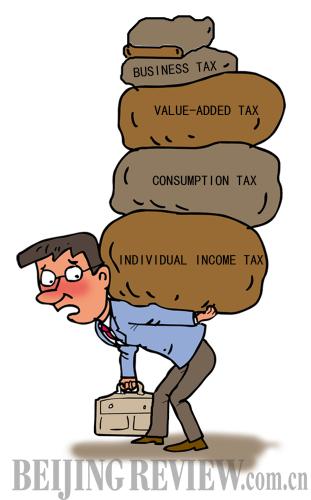|
 |
|
(LI SHIGONG) |
In March 2009, Forbes magazine produced a Tax Misery Index list, listing countries in descending order and evaluating the harshness of the taxes imposed in 50 countries it selected. China was listed second on the list, after France.
Greater numbers of people are questioning China's taxation system, and the Forbes' listing has aroused heated debate among the public. The focal points of the dispute include whether the taxation burden in China is heavy and how the taxes in China should be viewed. Various opinions on this issue have been put forward. They include:
Zhou Jiangong (http://finance.sina.com.cn): The purpose of the Tax Misery Index list is offering a consistent standard of evaluating people's feelings about how heavy the tax burden is. There are two reasons why this list in 2009 suddenly attracted people's attention and aroused heated debate in 2011.
First, tax reform is topical these days, for example, because of the personal tax reform this year. The second and the deeper reason is taxpayers' greater awareness of their individual rights.
After paying lots of money, taxpayers care about many of these things: Where does the money go? Will the government make good use of it? How will the government manage the tax revenue? What about the quality of public services the government should provide because of the taxes? Is the structure of fiscal expenditure appropriate and transparent?
With a more clear sense of individual rights, taxpayers will always ask those questions and the government has the obligation to answer them. As a core system of a country, the taxation system shows the basic values and principles of the government. No taxation system in the world is perfect and it is always the center of debate. In China, what is most urgently needed is a transparent system and procedures for all concerned groups to express their opinions and suggestions about the taxation system.
Zhu Qing (People's Daily): Common people can feel real benefits of tax increases from expenditure on improving people's livelihoods, such as education, medical care and caring for the aged. On the other hand, they don't get these benefits from spending on national defense, economic construction and administrative management.
Therefore, when the government spends less improving people's livelihoods, people are more likely to feel they don't benefit from paying taxes, which gives them a stronger sense of a heavy tax burden. This reminds the government to consolidate the structure of fiscal expenditure and to improve its efficiency and quality, making sure the taxes are, to the largest extent, spent on the people the money comes from.
| 